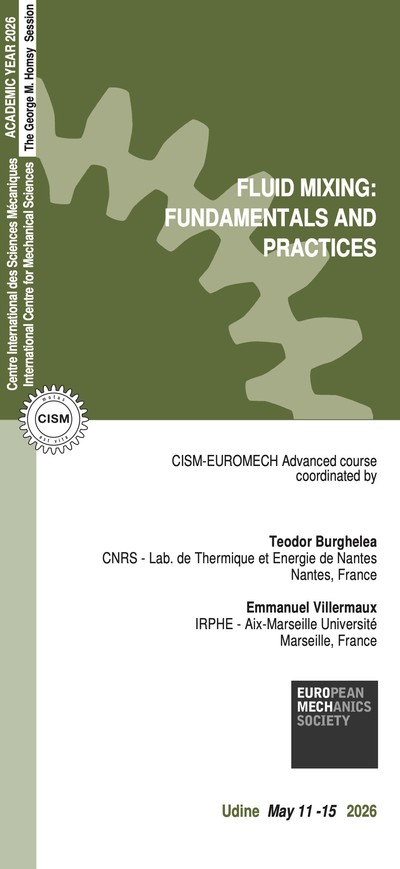D. Flad, G. J. Gassner. On the use of kinetic energy preserving DG- schemes for large eddy simulation. Preprint arXiv:1706.07601 (2017).
B. Froehle, P.-O. Persson. A high-order discontinuous Galerkin method for fluid-structure interaction with efficient implicit- explicit time stepping. Journal of Computational Physics 272:455- 470 (2014).
G.J. Gassner, A.R. Winters and David A. Kopriva. Split Form Nodal Discontinuous Galerkin Schemes with Summation-By-Parts Property for the Compressible Euler Equations. Journal of Computational Physics 327:39-66 (2016).
G. Giorgiani S. Fernández-Méndez, A. Huerta. Hybridizable discontinuous Galerkin with degree adaptivity for the incompressible Navier–Stokes equations. Computers & Fluids 98:196-208 (2014).
M. Kronbichler, W. A. Wall. A performance comparison of continuous and discontinuous Galerkin methods with fast multigrid solvers. Preprint arXiv:1611.03029 (2016).
R.J. LeVeque. Numerical methods for conservation laws, Springer. Originally published by Birkhauser Verlag (1992).
R. Lohner. Improved Error and Work Estimates for High Order Elements. International Journal on Numerical Methods in Fluids 72(11):1207-1218 (2013).
R. Lohner, E. Haug, A. Michalski, D. Britto, A. Degro, R. Nanjundaiah and R. Zarfam. Recent Advances in Computational Wind Engineering and Fluid-Structure Interaction. Journal of Wind Engineering and Industrial Aerodynamics 144:14-23 (2015).
R. Sevilla and Antonio Huerta. Tutorial on hybridizable discontinuous Galerkin (HDG) for second-order elliptic problems. In J. Schröder and P. Wriggers (eds.), Advanced Finite Element Technologies, volume 566 of CISM International Centre for Mechanical Science, pp. 105-129 (2016).
E.F. Toro. Riemann solvers and numerical methods for fluid dynamics. A practical introduction. Third edition, Springer (2009).
W. Pazner and P.-O. Persson, Approximate tensor-product preconditioners for very high order discontinuous Galerkin methods. reprint arXiv:1704.04549 (2017).
6 lectures on: Hybridizable Discontinuous Galerkin (HDG) methods for the Laplace equation: implementation, revision of a Matlab code, convergence and superconvergence, efficiency comparison vs continuous FEM. HDG formulation for incompressible flow problems: implementation, Matlab code, efficiency and stability comparison vs continuous FEM.
6 lectures on: Split-form discontinuous Galerkin methods for compressible Fluid Dynamics, DG and summation-by-parts, discrete stability and de-aliasing, high order DG and explicit turbulence modeling.
7 lectures on: Introduction to discontinuous Galerkin methods for scalar transport equations, sum factorization for evaluation of integrals in context of explicit time integration, efficient solution of linear systems with fast operator evaluation and its limitations. High-performance computing aspects in DG: parallel scalability and fast absolute performance on the next-generation exascale computers.
4 lectures on: The tradeoff of high versus low order methods: What accuracy is relevant in an engineering application? What is the speed/accuracy ratio of high order methods? What happens to high order methods in applications where monotonicity is important? Are high order methods relevant for applications where butterfly effects are present?
6 lectures on: Practical use of high-order discontinuous Galerkin methods for problems in fluid and solid mechanics: sparse discretizations, efficient preconditioners and iterative solvers, parallel implementations, calculations of sensitivities using fully discrete adjoints. Various methods for generation of appropriate curvilinear meshes. Specialized solvers for multiphysics problems such as fluid-structure interaction.
6 lectures on: Accurate numerical fluxes for compressible and for incompressible flows: numerical fluxes in finite volume and DG approximations of hyperbolic problems, exact and approximate Riemann solvers, Riemann solvers and high-order accurate DG methods, application to incompressible flows, limitations related to specific problem physics (low mach numbers, low shock speeds, wall overheating, etc.).
* Italian VAT is 22%.





